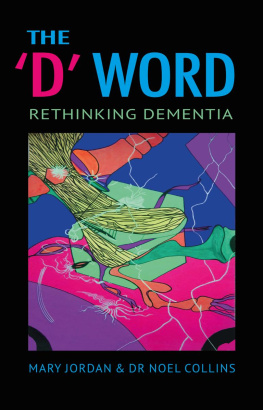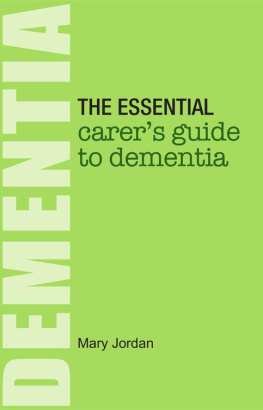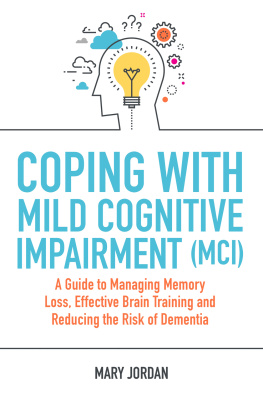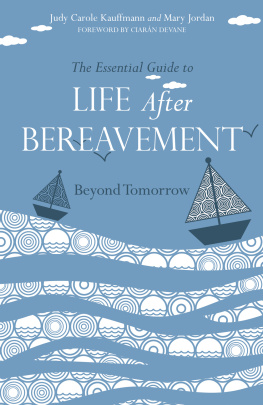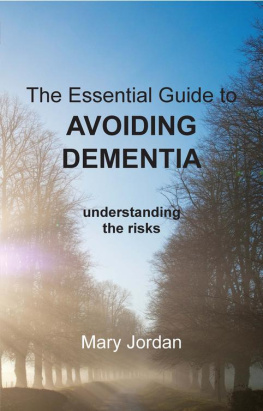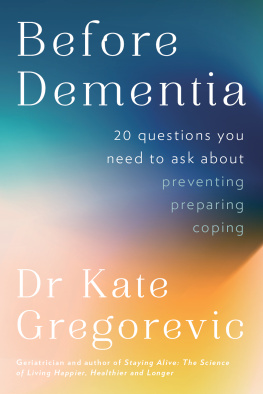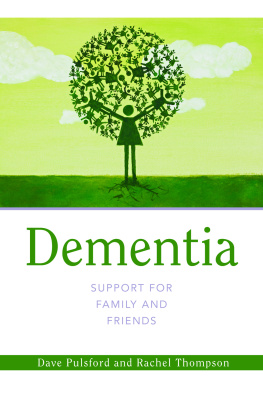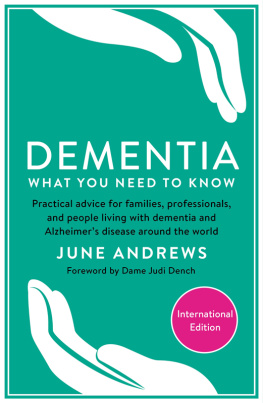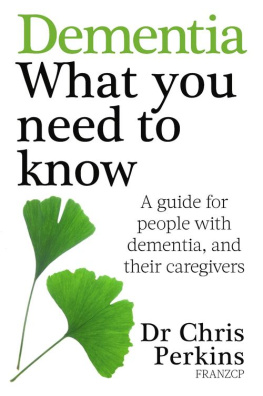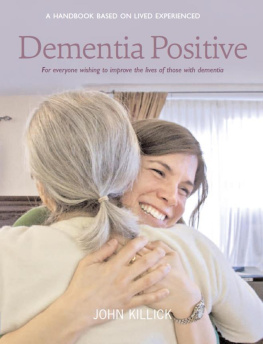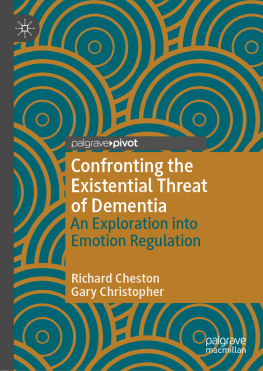To all my past clients who have taught me so much about caring.
Mary
This book is dedicated to all the people that I have met over the years living well with dementia and proving that the D word doesnt have to be the final word.
To Yvonne and Craig Moss for all their care to Max.
Noel
First published in 2017 by Hammersmith Health Books an imprint of Hammersmith Books Limited
4/4A Bloomsbury Square, London WC1A 2RP, UK
www.hammersmithbooks.co.uk
2017, Mary Jordan and Noel Collins
All rights reserved. No part of this publication may be reproduced, stored in any retrieval system or transmitted in any form or by any means, electronic, mechanical, photocopying, recording or otherwise, without the prior permission of the publishers and copyright holders.
The information contained in this book is for educational purposes only. It is the result of the study and the experience of the authors. Whilst the information and advice offered are believed to be true and accurate at the time of going to press, neither the authors nor the publisher can accept any legal responsibility or liability for any errors or omissions that may have been made or for any adverse effects which may occur as a result of following the recommendations given herein. Always consult a qualified medical practitioner if you have any concerns regarding your health.
British Library Cataloguing in Publication Data: A CIP record of this book is available from the British Library.
Print ISBN 978-1-78161-114-2
Ebook ISBN 978-1-78161-115-9
Commissioning editor: Georgina Bentliff
Edited by Carolyn White
Cover design and typesetting by: Sylvia Kwan
Cover image: Chris Jordan, reproduced in memoriam
Index: Dr Laurence Errington
Production: Helen Whitehorn, Pathmedia
Printed and bound by: TJ International Ltd
Contents
Many people have been involved in the writing of The D Word. Those who played the biggest part were, once again, the people I have met who are living with dementia (either with a diagnosis or as carers and supporters) who gave the practical stimulus to my input. This book is written for them. I would like to thank Professor Peter Tyrer, FMedSci, for his discussions with me about the idea of using nidotherapy for people with dementia. My thanks also go to Dr Gillian Nienaber, BA Hons, BSc Hons, CinPsychD, who has given me constant help and facilitated expansion of my knowledge and experience of dementia.
My Editor, Georgina Bentliff, has, as always, given excellent technical support as well as wise encouragement and been endlessly patient with me. My sons and daughter-in-law have helped in the way that only close family can.
Mary, 2017
I would like to thank Mary and Georgina for all their expert advice and encouragement, and Carolyn for her expert editing. Also many thanks must go to Keith and Rosemary for their eagle-eyed critique of draft chapters. Lastly, I thank my husband Alberto, for his patience in living with The D Word over the last year and his unstinting love and support.
Noel, 2017
Since being diagnosed in 2010 with young-onset Alzheimers disease, I have read very many books on the subject, using the adage that for me information is power, in this case over Dr Alzheimer who resides inside my brain and from time to time causes some considerable mischief. Books I read in the early days were either focused on academics or on carers, and if a lay person wrote a foreword or preface it was usually a carer most often one who had recently sadly lost their loved one after a traumatic end of life. Increasingly, with earlier and more accurate diagnosis, and with better post-diagnostic support and interventions, the voice of people like me is now being heard. Moving this forward, what we need are more and better examples of co-production and professionals writing with real insight and sensitivity, and that is what we have, I am delighted to say, within this book.
The D Word presents two distinct yet entwined perspectives on what dementia entails for those living with the condition from two professionals who seek to deliver person-centred care. Noel clearly explains the science with insight and personal experience in order to help readers navigate their way without losing sight of the fact it is people who are at the centre of the issue, not statistics, numbers, service users, carers or patients. Alongside this, Mary draws from, and comments upon, a wealth of experience largely in the third sector (voluntary/unpaid) which is increasingly being called upon to support people affected by dementia after diagnosis through a range of interventions.
I have known Noel for a little more than four years. We first met at a conference for the British Psychological Society and the Alzheimers Society, and I was taken by his approach to de-mystifying the medical science around dementia and to challenging some widely held views by some of his colleagues in psychiatry. Following this we served together for two years on the Executive Committee of the Faculty for the Psychiatry of Old Age, where he helped a mere mortal like me to make some hopefully useful contributions. When he shared the thoughts about writing a book and for me to be involved he resisted the trap that many fall into by way of sending me a few samples to read and then write about. Noel actually came to my house and met with me to discuss the concept and contents of the book when it was still being written. He asked for my thoughts and advice and over a glass of Aussie red some lively conversation was conducted between us. Then, when the book was in draft, it was left to me how much I wanted to receive and how it could be best sent to me paper rather than electronic so I could read it and annotate the text. Noel did all of this. I share this with you, the reader, because what I have described is very rare, and should not be; I am therefore delighted to share some thoughts on what will be a fundamental text in the library of books available on dementia.
At first, the choice of the title, The D Word, puzzled, concerned and challenged me as I would not want people to refrain from using the word dementia in the way that people have shifted from using the C word to talking openly about cancer. But then I know too well there are many people who are either service providers or service users who still fear the stigma which is so often attached to dementia and who use words like memory problem to avoid its use. I do hope that this book will go some way to helping address this.
Seldom does a week pass that dementia fails to appear in the national media, usually with a headline around a so-called wonder drug or the failures of our care system. Consequently, it is not surprising that dementia is regarded as the most feared health condition in the over-40 demographic. This book examines in depth factors around this and goes on to state that this need not be the case if understanding, compassion and appropriate care and support are available to people. I know from lived experience that living well with dementia is a double-edged sword, something to strive for and encourage while also being aware that it is not always possible and that then the emotional and psychological consequences of feeling that one is failing are often substantial. One lives with dementia and those closest to us live with us and what the condition brings with it. Everyone is different and this in a way makes the medical model, where symptoms and treatments can be prescribed or carried out to restore ones health, less successful in connection to dementia. In this book the authors have critically examined the medical and care aspects of dementia alongside a comprehensive analysis of what has justifiably been called the biggest challenge to health and social care in this country, and beyond.

